ŌĆ£Hole in the WallŌĆØ: Inside the American Legion on the border
Veterans gather at the American Legion in Akwesasne
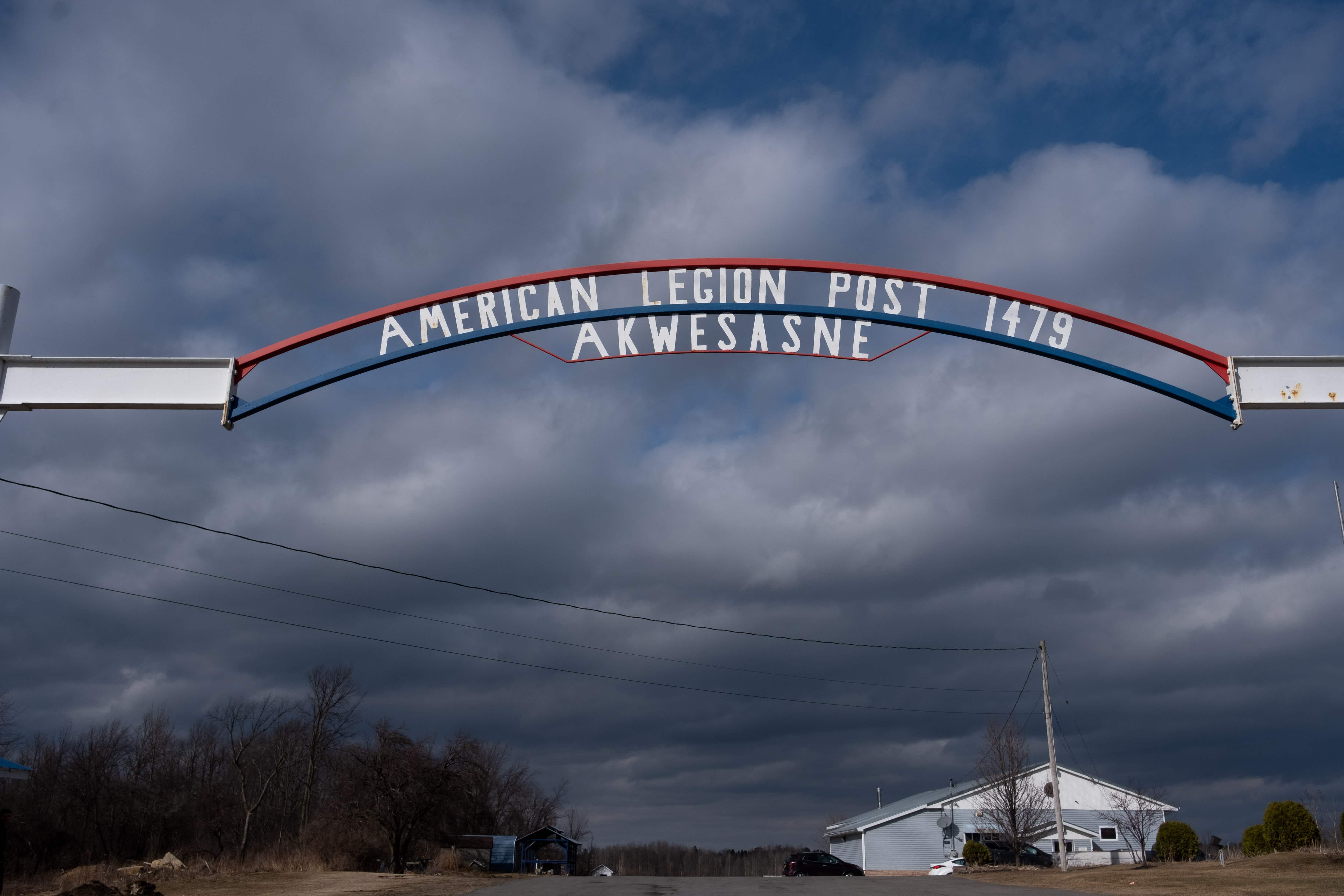
Tucked away on state Route 37, just minutes from the U.S.-Canada border, sits a bar with a wooden ceiling covered in American flags. Veterans and their spouses start to funnel into the American Legion Post 1479 around 11 a.m. on most mornings, two hours after the bar opens, with country music blasting and rows of long wooden tables.
Most of these veterans come from Akwesasne, a Native American territory bordering New York, Quebec and Ontario. Hundreds from Akwesasne fought in World War II, as combat soldiers or as code talkerŌĆö soldiers who used their native language as a means of secret communication to help the U.S. Army.
But the legion on the American side is the only place dedicated to veterans other than a graveyard. So veterans and their families from Akwesasne crowd the bar on weekends and share stories among friends.
Over the course of a weekend in April, we got to hear some of those stories. Here are a few of them.
Dwight Bero Sr.
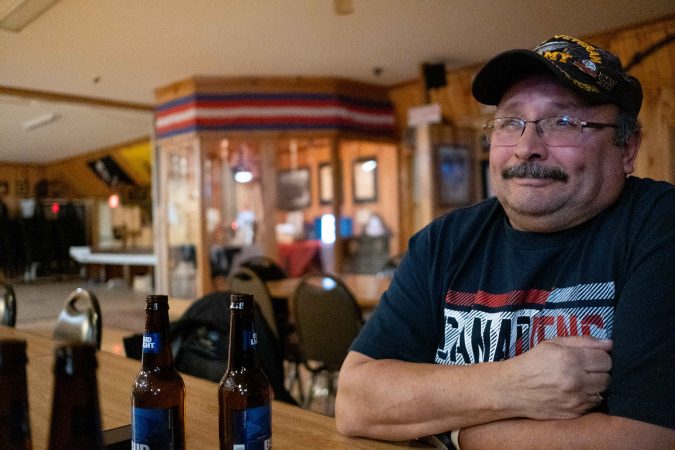
After his seven years in the U.S. Army, after he was stationed in Fort Sill, Oklahoma and after he turned down a job in Chicago to stay in Akwesasne, Dwight Bero Sr. stood at a muddy grass box near his home.
It became his childrenŌĆÖs lacrosse field and his outdoor classroom where he taught his daughters to play hockey in the mid-1990s. Where his son posed for a picture with his curly red mullet, mud-stained boots and his first wooden lacrosse stick, which they still keep in their home. Where he raised his three children long after that grass box lost its use ŌĆō driving them to practices on the reservation and tournaments throughout Canada.
He taught his children morals through sport: condition yourself for the third period because thatŌĆÖs what champions do. You better start liking your teammates, because youŌĆÖll know them for the rest of your life. YouŌĆÖre never the away team because your ancestors are beside you when you play.
Soon, he stopped driving his kids to practices and started driving by himself to their games – an hour to Appleton Arena to see his daughter, Alley, play hockey at St. Lawrence University. Three hours to Tennity Ice Pavilion at Syracuse University to watch his older daughter, Katie, play hockey. Four hours to Scully-Fahey Field in New Hampshire to watch his son play lacrosse at Dartmouth College. All three of his kids had earned Division 1 scholarships, but donŌĆÖt tell Bero Sr. that their education was free. He paid through years of coaching and hours of driving and long nights in faraway hotel rooms. He taught them to play his way ŌĆö and how to represent the small community that raised them.
ŌĆ£WeŌĆÖre from the community where our ancestors are buried, where our grandparents are buried,ŌĆØ Bero Sr. said on a Friday night, sitting at a long wooden table by the bar. ŌĆ£Where our mothers and fathers are buried. We all go to school together, we play in hockey and lacrosse year-round together, you know each other inside and out. WeŌĆÖre the only hometown here.ŌĆØ
He had dealt with parents who didnŌĆÖt like his coaching style and kids who needed extra guidance. He drove across the U.S. and Canada to coach his childrenŌĆÖs games.┬Ā Oftentimes he would wake up when it was dark out, drive hours to an arena, drive back home and get to bed after the sun had set.
On a Friday night in early April, Bero Sr.┬Ā stood up and walked to a wooden plaque of World War II veterans that came from the six Haudenosaunee nations. He was proud that he served and knew it was for a good cause. Yes, rifts with the U.S. government had been part of Akwesasne’s history. But wasnŌĆÖt that better than if another country took over? For Bero Sr, he had to protect the land he came from, so to him, the answer was obvious.
Bero Sr. wore his signature ŌĆ£Native American veteranŌĆØ hat and stood in the back of the legion next to his son, Dwight Bero Jr.┬Ā A plaque commemorating Haudenosaunee veterans in World War II was stuck to the wall, etched with hundreds of names.┬Ā He stared at the wall, and thought back to his days at war: he took pride in fighting for George H.W. Bush and saw a purpose in what he did.
ŌĆ£When I was in the military, he was the man in charge,ŌĆØ Bero Sr. said. ŌĆ£I had a very good time with that.ŌĆØ
Dwight Bero Jr.
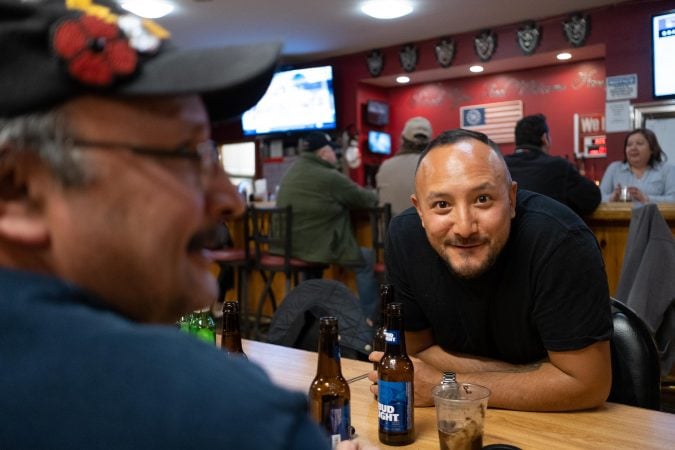
Dwight Bero Jr. looked up from his phone and glanced across the wooden table at his father. He held up a picture of when he was three years old, standing in the muddy grass box that he grew up in.
ŌĆ£Red jersey, blue mud boots,ŌĆØ he said, laughing. ŌĆ£The mullet!ŌĆØ
ŌĆ£That was his first wooden stick, too,ŌĆØ Bero Sr. chimed in.
Bero Jr. had spent his life preparing for college, training with his father or long nights of studying. He transformed from the kid with the mullet to a three-sport captain at Salmon River High School in nearby Fort Covington, New York. He was named valedictorian and was determined to make a name for himself playing college lacrosse. He went to prep school for a year and received a full scholarship at Dartmouth College to play lacrosse. But soon after he arrived in New Hampshire, he missed what got him there in the first place.
ŌĆ£It is hard being away for college,ŌĆØ he said in an interview for Oral History: These Words Are Not My Own, a project out of Dartmouth CollegeŌĆÖs creative writing program. ŌĆ£I forget the stories; I lose everything. I canŌĆÖt wait to move back, IŌĆÖm just one of the boys when IŌĆÖm home.ŌĆØ
Lacrosse was his ŌĆ£medicine gameŌĆØ in Akwesasne, like it was for everybody. When different clans would play each other on the reservation, his coaches would turn off the lights in the locker room before the game, and pound the walls with their fists. It sounded like a heartbeat. TheyŌĆÖd burn tobacco as a sacrifice to their creator, and stay there, together, before they competed.
But at Dartmouth, those memories became distant. Bero Jr. felt himself losing his identity – his language, his culture and his memories. He was the only one of his friends to go to college, and often, he felt like he was there for them instead of himself. He found himself yearning to go back because Akwesasne was all that he knew.
Now, more than five years after he returned to Akwesasne, he connects Akwesasne students to colleges. He wants kids from Akwesasne to experience what he did. Of the 60 to 80 students that graduate college each year, only about ten donŌĆÖt return to the reservation, Bero Jr. said. He wants students to see whatŌĆÖs past the reservation but takes pride in seeing them return.
Now that heŌĆÖs home, he wants others to experience what he did.
Darius White
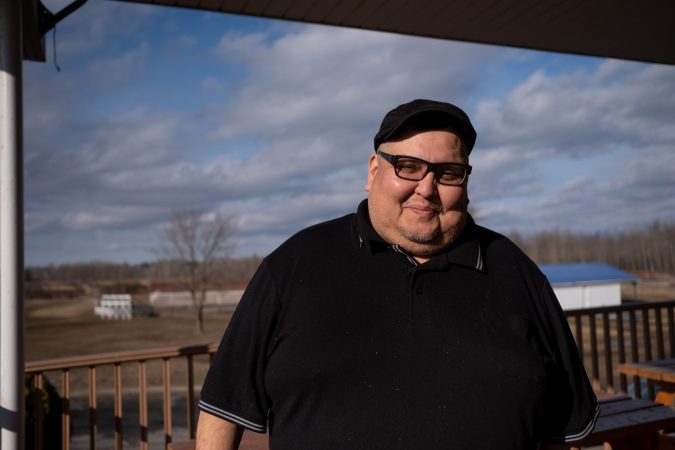
Darius White was just trying to leave his mark.
He saw the food that kids were eating at school, so he became a chef at the Akwesasne Mohawk School. He wrote poetry in college and decided to pick up a column in the local paper. He ordered a drink that he made himself ŌĆō his ŌĆ£babyŌĆØ ŌĆō a mixture of more than 20 different ingredients that he grows himself and sells in seven different stores. He had dreams of selling his drink off the reservation, and selling to ŌĆ£every person out thereŌĆØ ŌĆō so he could feel like heŌĆÖs making a difference.
ŌĆ£I just need to create something, just to put my stamp down and [say] ŌĆślook, this is what I did,ŌĆÖŌĆØ he said, sitting on a barstool on a Saturday afternoon. ŌĆ£IŌĆÖm 44 years old, the clocks ticking, I hate to say it but sometimes I think the clocks is just running out. ThatŌĆÖs why IŌĆÖm doing it, manŌĆØ
He works three jobs, seven days per week, from sunup to sundown. He arrives at Akwesasne Mohawk School at 5 a.m. even though his shift starts two hours later. He prepares home-cooked meals at the school for breakfast, and then again for lunch. He leaves school long after the kids did, then does it again the next day.
But on a Saturday in early April, he sat at the bar and sang along to The Devlins. Then he requested The Stone Foxes and ordered another Michelob. He rolled dice out of a plastic cup and stepped outside to smoke a cigarette. He played the air guitar and danced in his seat.
At this point, he didnŌĆÖt know what his mark would be, and at this moment, why did it matter? Long days of work had led to a stress lump on his neck, and then a second lump right below that. His doctor told him to take a month-long break for the sake of his own health. He had an operation scheduled for late April, so he killed time at the legion, ordering beer and talking with anyone that would listen.
Like most days, he arrived at 11 a.m. and planned to stay until dinner. He reminisced of his days traveling, looking for music: Driving to Barry, Ontario, for Lollapalooza in ŌĆś96. Woodstock in ŌĆÖ94 and again in ŌĆś99. Small venues in Vermont with less than 50 people in the audience. He still sang folk country and rock and roll, often times performing in front of his friends at the legion. Throughout his upbringing, his college years in Florida, his three jobs and his family, music stuck with him. ItŌĆÖs what connected him with people and made him feel alive.
ŌĆ£IŌĆÖm trying to bring real music to this little f—— hole in the wall,ŌĆØ he said. ŌĆ£I just want these people to realize thereŌĆÖs better music than what weŌĆÖve been listening to for years.ŌĆØ
Kelly Edwards
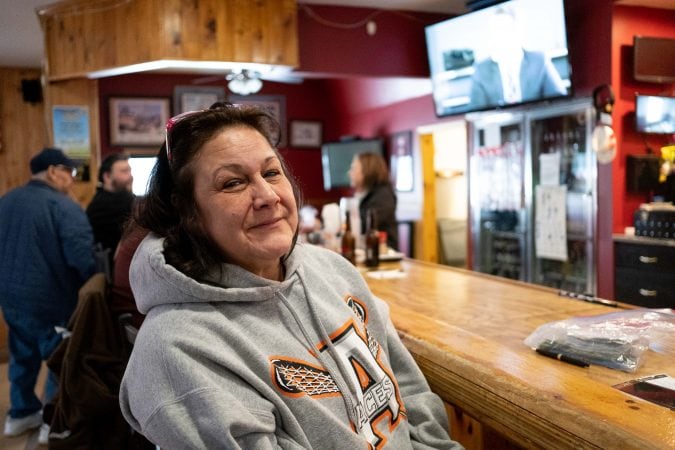
Like every Sunday afternoon, Kelly Edwards, 57, sat on a barstool with two plastic bags full of raffle tickets: $5 per ticket, $26,000 jackpot. Wearing her grey ŌĆ£AcesŌĆØ sweatshirt, she watched as the early afternoon drinkers trickled in at 12:30 p.m., holding out her plastic bag.
ŌĆ£I come every Sunday,ŌĆØ she said. ŌĆ£If I donŌĆÖt come, theyŌĆÖre calling me.ŌĆØ
She sat at the legion bar, scraping funds for her grandson TylerŌĆÖs lacrosse team. On a trip back from a Florida tournament Tyler realized he was without a team – too old for his former travel team, but too young for Junior BŌĆÖs – the next level up. Itching to play lacrosse, but without a team to play for.
So they bought their own jerseys, their own helmets, their own jackets and their own merchandise. They designed their own logo and scheduled their own tournaments. The Akwesasne Aces were founded in 2017 and traveled to New Jersey, Florida, Onondaga and Buffalo. They won tournaments throughout the U.S. and Canada. They fundraised locally: parents across the reservation promoted raffles and stores had started selling tickets. Local stores did, too – Akwesasne Mini Mart, Big Boys Gas, Three Feathers ŌĆō among them.
ŌĆ£TheyŌĆÖre doing well,ŌĆØ Edwards said, scrolling through photos of the team on her phone: the group when they first started. Their first championship soon after. Weekly raffle winners. A championship in Rochester. ŌĆ£TheyŌĆÖve won a lot.ŌĆØ
She usually doesnŌĆÖt drink at the bar. She comes, she sells her tickets and she leaves. Players, parents and grandparents would spread out across the reservation, promoting the weekly raffle. To Edwards, she was just doing her part.
Her other son played lacrosse at Genesee Community College and her uncle, Onondaga Faithkeeper Oren Lyons, became an all-American at Syracuse University. Lacrosse runs in her family. It kept the kids out of trouble, and It gave them a sense of purpose.
So she sat there with a glass of water as her peers drank beer and whiskey.
ŌĆ£ItŌĆÖs getting them where they have to go,ŌĆØ she said, eyeing the bag of tickets.







